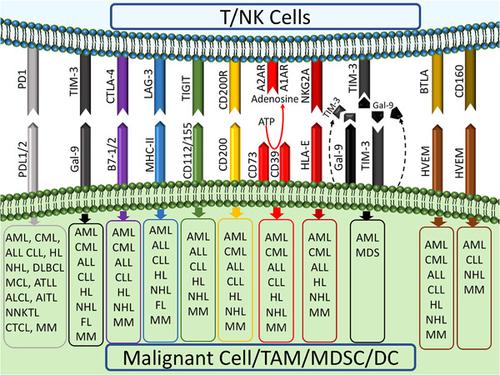当前位置:
X-MOL 学术
›
J. Cell. Physiol.
›
论文详情
Our official English website, www.x-mol.net, welcomes your
feedback! (Note: you will need to create a separate account there.)
Immune checkpoints in hematologic malignancies: What made the immune cells and clinicians exhausted!
Journal of Cellular Physiology ( IF 4.5 ) Pub Date : 2020-05-07 , DOI: 10.1002/jcp.29769 Abbas Hajifathali 1 , Sayeh Parkhideh 1 , Mohammad H Kazemi 1 , Rouzbeh Chegeni 2 , Elham Roshandel 1 , Majid Gholizadeh 1
Journal of Cellular Physiology ( IF 4.5 ) Pub Date : 2020-05-07 , DOI: 10.1002/jcp.29769 Abbas Hajifathali 1 , Sayeh Parkhideh 1 , Mohammad H Kazemi 1 , Rouzbeh Chegeni 2 , Elham Roshandel 1 , Majid Gholizadeh 1
Affiliation

|
Hematologic malignancies comprise a considerable part of cancers with high mortality at any age. Since the introduction of hematopoietic stem cell transplantation (HSCT), the overall survival of patients dramatically increased. The main goal of HSCT is the induction of a graft‐versus‐leukemia effect to eradicate the residual cancer cells and also reconstitute a healthy immune system for patients. However, relapse is a nettlesome challenge of HSCT. Like many other tumors, hematologic cancer cells induce immune exhaustion leading to immune escape and relapses after HSCT. Besides malignant cells, inhibitory cells such as tumor‐associated macrophages and myeloid‐derived suppressor cells express various inhibitory receptors capable of inducing exhaustion in immune cells, especially T and natural killer cells. The significance of immune checkpoint blocking in tumor regression in clinical trials led to the 2018 Nobel Prize in Physiology/Medicine. Here, we reviewed the clinical roles of immune checkpoints in hematologic malignancies and post‐HSCT relapses.
中文翻译:

血液系统恶性肿瘤的免疫检查点:是什么使免疫细胞和临床医生筋疲力尽!
血液学恶性肿瘤在相当大的年龄段的癌症中占很大一部分。自从引入造血干细胞移植(HSCT)以来,患者的总生存期显着增加。HSCT的主要目标是诱导移植物抗白血病作用,以清除残留的癌细胞,并为患者重建健康的免疫系统。但是,复发是HSCT的一项严峻挑战。像许多其他肿瘤一样,血液癌细胞诱导免疫力衰竭,导致免疫逃逸并在HSCT后复发。除恶性细胞外,抑制性细胞(如肿瘤相关的巨噬细胞和髓样抑制性细胞)还表达多种抑制性受体,能够诱导免疫细胞(尤其是T和自然杀伤细胞)衰竭。在临床试验中,免疫检查点封闭在肿瘤消退中的重要性导致了2018年诺贝尔生理学/医学奖。在这里,我们回顾了免疫检查点在血液系统恶性肿瘤和HSCT后复发中的临床作用。
更新日期:2020-05-07
中文翻译:

血液系统恶性肿瘤的免疫检查点:是什么使免疫细胞和临床医生筋疲力尽!
血液学恶性肿瘤在相当大的年龄段的癌症中占很大一部分。自从引入造血干细胞移植(HSCT)以来,患者的总生存期显着增加。HSCT的主要目标是诱导移植物抗白血病作用,以清除残留的癌细胞,并为患者重建健康的免疫系统。但是,复发是HSCT的一项严峻挑战。像许多其他肿瘤一样,血液癌细胞诱导免疫力衰竭,导致免疫逃逸并在HSCT后复发。除恶性细胞外,抑制性细胞(如肿瘤相关的巨噬细胞和髓样抑制性细胞)还表达多种抑制性受体,能够诱导免疫细胞(尤其是T和自然杀伤细胞)衰竭。在临床试验中,免疫检查点封闭在肿瘤消退中的重要性导致了2018年诺贝尔生理学/医学奖。在这里,我们回顾了免疫检查点在血液系统恶性肿瘤和HSCT后复发中的临床作用。











































 京公网安备 11010802027423号
京公网安备 11010802027423号